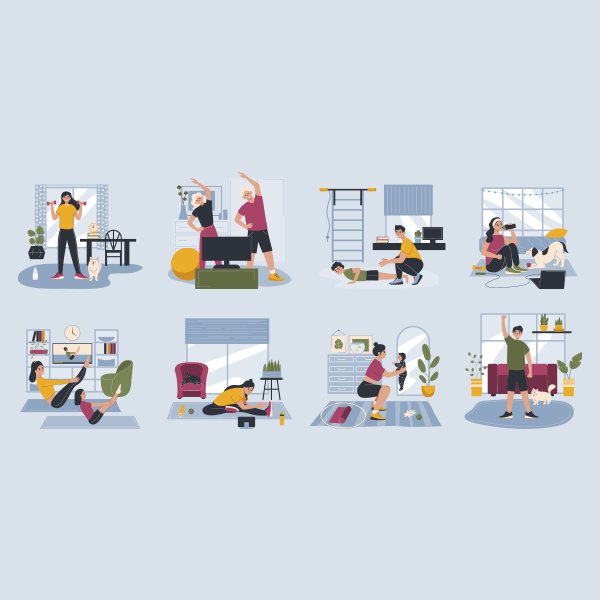A Peaceful sleep is not only essential for physical well-being but also for a complete mental peace and health. A better night’s sleep is necessary to reduce stress, anxiety and depression leading towards a healthy boost in confidence and energy levels. Everyday, human body goes through a lot, just like a machine, at the end of the day, it requires a better night’s sleep to prepare itself for the chaos of the upcoming day. The importance of good sleep can be understood by one’s who take sleeping pills and other sleeping aids to achieve a better night’s sleep. Here we will talk about 6 tips and tricks for improving sleep quality to achieve a better night’s sleep.
1. Stick To a Consistent Sleep Schedule for a Better Night’s sleep
Circadian rhythm is our body’s natural internal clock which is designed to regulate the sleep and wake cycle. We can sync our bodies to this natural system to maintain a consistent and regular sleep schedule. This can help an individual to achieve a better night’s sleep and make it easier to fall asleep and wake up. Our circadian rhythm can be easily disrupted by irregular and abnormal sleep routines that is staying up late at nights and eventually waking up late in evening. This could lead to fatigue and sleepy days. By following a regular sleep schedule, we make our bodies used to sleep at certain times and make it easier to fall asleep and wake up feeling rested.
2.Create a Relaxing Bedtime Routine
A relaxing bedtime routine signals the body to wind down and prepare to sleep. A relaxing bedtime routine helps the mind and body to stay calm, reduce stress and prepare itself for a better night’s sleep. It is essential to stay away from electronic devices and screen before going to bed as they can interfere with body’s natural sleep cycle and make it more harder to fall asleep. Some techniques to prepare a relaxing environment are to take a warm shower, practice deep breathing or meditation, practice yoga or stretching. These can help to achieve a relaxing bedtime leading towards a better night’s sleep.
3. Make your Sleep Environment Comfortable to Achieve a Better Night’s Sleep
Creating a comfortable sleep environment makes it cozy and easier to fall and stay asleep, and helps to improve the quality of sleep. Many things can contribute to make comfortable sleep environment.
1. Mattress and Pillows
Make sure to use comfortable mattress and pillows that provide required support to body including proper positioning of head and neck. Try to use mattress and pillows that are of required thickness and hardness to avoid feeling of pain and restlessness.
2. Temperature
Temperature plays an important role in relaxing human body and putting it into sleep. The ideal temperature is 60-67°F (15-19°C) for sleep. Keeping the bedroom cool and calm can help to improve the quality of sleep.
3. Lighting
To promote restful sleep, try to keep the bedroom dark. An eye mask can serve to provide dark environment and promote deep sleep. Certain night bulbs can also serve to provide minimum amount of light to sleep peacefully.
Noise
Noise can make it difficult to fall and stay asleep, try to minimize noise as much as possible. Earplugs can also be used for minimizing noise.
4. Limit Caffeine, Alcohol, and Nicotine for a Better Night’s Sleep
Caffeine, alcohol and nicotine can interfere with quality of sleep and makes it difficult to stay fall asleep. Caffeine acts as a stimulant that keeps us awake and makes it very difficult to fall sleep. So, it is bad for a achieving better night’s sleep. It is better to avoid stimulants several hours before bed time. Alcohol can disrupt the quality of sleep, causes irregular sleep cycle and can led to restless sleep. Nicotine can cause frequent awakenings during the night and can cause restless sleep.

5. Reduce Screen Time for a Better Night’s Sleep
The electronic devices emit blue light that disrupt the body’s natural sleep wake cycle, making it very hard to fall and stay asleep. When exposure to electronic devices exceeds the limit, brain becomes more alert and produce less amount of melatonin, this hormone helps to regulate sleep. The are certain strategies to reduce screen time before bed:

1. Avoid Using Electronic Devices At Least 30 Min Before Going To Sleep
This helps to produce the required amount of melatonin to make you feel sleepy and finally make you fall and stay asleep.
2. Turn off Electronic Devices or Use a Blue Light Filter
Using a blue light filter or reducing amount of blue light exposure can help to get a better night’s sleep. This helps the brain to produce melatonin and falling asleep becomes easier.
3. Remove Electronic Devices From your Bedroom
To create a more relaxing environment, try to remove electronic devices from your bedroom that will helps to fall asleep faster and keep you asleep.
4. Use Alternative Activities to Wind Down Before Bed
Doing alternative activities like journalism, practicing deep breathing or meditation can help you to relax and prepare for sleep.
6. Regular Exercise to Experience a Better Night’s Sleep
Regular exercise can help to reduce stress, anxiety and depression which helps to get a better night’s sleep. To feel more relaxed and less stressed, it is important to keep your mind and body at peace. Exercise helps to increase the production of endorphins, these are natural painkillers that help to fight stress and promote relaxation. Exercise increase body temperature that regulate the body’s natural sleep wake cycle by promoting drowsiness and eventually causing a better night’s sleep.

1. Aim for At least 30 Minutes of Moderate Intensity Exercise Most Days of the Week
Moderate exercise including jogging, cycling, swimming and brisk walking can help to reduce stress and anxiety, leading towards a better night’s sleep.
2. Avoid Exercising Too Close to Bedtime
Doing exercise 3 hours before bedtime can make it harder to fall asleep because of certain reasons.
3. Be Consistent with your Exercise Routine
Being consistent with your exercise routine can help regulate the body’s natural sleep wake cycle.
The Bottom Line
To experience a peaceful night’s sleep, it is crucial to establish a consistent sleep routine and stick to it diligently. Achieving a restful sleep requires a willingness and commitment from oneself to prioritize it. It requires patience, time, and steadfastness to cultivate good sleep habits and sustain them.
A good night’s sleep not only rejuvenates the body but also has a profound effect on one’s mental well-being. Therefore, it is vital to care for your sleep cycle as it significantly contributes to maintaining a peaceful state of mind.
Remember, it is never too late to develop healthy sleep habits. With persistence and dedication, a better sleep pattern can be established, leading to improved mental and physical health. So, let’s make sleep a priority and commit to a consistent sleep routine for a happier and healthier life!
Recommended Read: The Connection Between Gut Health and Mental Health: Exploring the Link Through Diet

